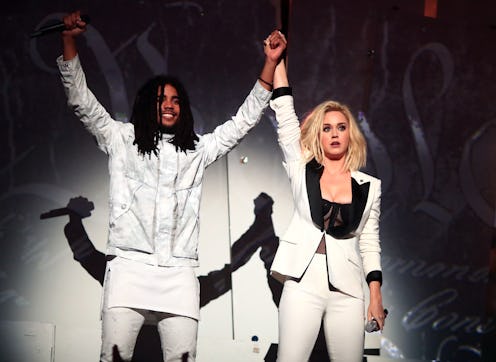Entertainment
The 2017 Grammys Were Super, Super Political

"This is precisely the time when artists go to work." We'd barely run through the first hour of the 2017 Grammys, and there was Jennifer Lopez, distilling the truth into an apt observation courtesy of Toni Morrison. It was so important that the 2017 Grammys were political, lest they risk becoming a circus during an awards season already rife with reflection and action. What critics will try to say is that art has no place in politics, that the two spheres have no reason to overlap. That's foolish: art is political, and I would dare to say that music is the most political of art forms. At the Grammys, there was time to revel and rejoice, yes, but the ceremony also presented an opportunity to speak up that was not lost on many musicians.
Given the heightened political awareness we as a nation are going through, and knowing that various musicians and celebrities that have been politically active in the past would be there (think Beyoncé, Kety Perry, Chrissy Teigen, and Lady Gaga), it would have been more jarring had the Grammys been apolitical. There was no need to hide behind the glitz of the evening when the industry that was coming together to celebrate has big roots in politics. The music, regardless of genre or artist, that we've come to love over the past year got rewarded, but it also got a new political lens laid over it. It's far from the first time that artists responded to the times with their art, but, at the 2017 Grammys, they rose to the occasion marvelously.
Lopez's comments on the current political and social climate serving as the right time for artists to go to work started the Grammys on a high note. She reminded the audience that now is as good a time as ever — when negative or false news stories are circulated and racist, isolationist policies are put forth from our government — to resist the hatred and push for productive resistance. If you can't use your speaking voice to affect change, then why not spread your message in song?
Katy Perry also put a political message into her newest, politically-charged hit, "Chained to the Rhythm." Some feel it is a call to action, to fight through the distracting fripperies of life and do something meaningful. Additionally, her Grammys performance ended when she and Skip Marley (grandson of Bob Marley, a man whose music is also deeply political) locked hands while the Declaration of Independence was projected over them.
And, of course, A Tribe Called Quest included "We The People..." from their latest album We got it from Here...Thank You 4 Your service in their Grammys medley and brought out Busta Rhymes to deliver a verse. Rhymes took a moment to say "Thank you, Agent Orange," a clear jab at President Trump, linking him to the chemical agent allegedly used in the Vietnam War to kill innocent civilians.
And if the performances weren't putting forth a political message of resistance and empowerment, the speeches were. When Beyoncé took the stage to accept the award for Best Urban Contemporary Album, she made sure to include a heartfelt message about recognition of black excellence, culture, and humanity:
"My intention... was to give a voice to our pain, our struggles, our darkness, and our history. To confront issues that make us uncomfortable. It's important to me to show images to my children that reflect their beauty."
Contained though her speech may have been, Beyoncé touched on a necessary sore spot that became clear — the Recording Academy's racial blindness as bias — as the night wrapped up with the Album of the Year going to Adele for 25. Confronting racial inequality within the music industry, as illustrated by whose work was getting rewarded, became a small illustration of the racial inequality we have seen displayed on a larger scale through the course of the election — like stricter voting laws and gerrymandered voting districts.
One of the commercials shown at the Grammys was just as political. Nike debuted an ad called "Equality," where Michael B. Jordan asks, "Is this the land that history promised?" We watch a basketball game take place in the projects, then we cut to a tennis game with Serena Williams, then we move towards athletes of all races playing on the same team. Momentum builds as Jordan continues to say, "Equality has no boundaries."
It was a home run for Nike and its subversion of the expectation that the sporting goods brand would simply air an ad to shill a product was welcome in the explicitly political evening's proceedings.
While it's not what we may have expected from an awards show, you'd be hard-pressed to find someone who wasn't affected — positively or negatively — by what they saw on Sunday night. It's good, on occasion, to have that kind of political action happen in spaces where you didn't think it would be possible. When that happens at the Grammys, at the Golden Globes, at the Super Bowl, it only drives home the point that everyone has a horse in this race and it's important we all cross the finish line together.
Ultimately, it matters that the Grammys became political, and remained political, throughout the evening. The artists present were once again called on to do the work, express the work, and connect it to the world they are living in. The world that the artists inhabit is the same as our own — tumultuous, terrifying, and sparking political discourse — which meant we as an audience we more engaged than we expected. And, knowing they had our eyes and ears, the artists used the Grammys to take an important stand.